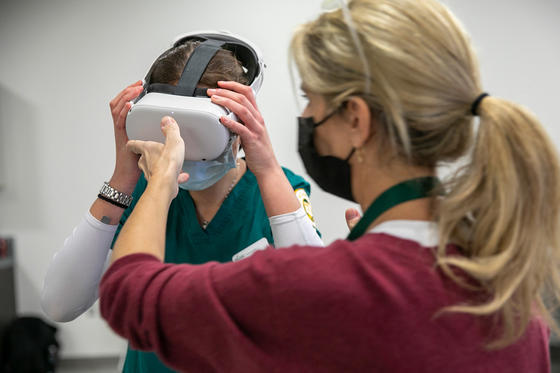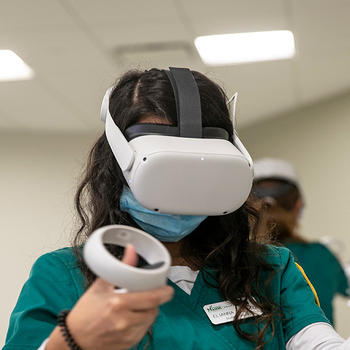
In search of novel tactics to accommodate a larger student body and fulfill workforce demands, nursing schools are developing new approaches to optimize learning, engage learners, and provide methods to ensure competency in future nursing graduates.
A recent study by Bethany Cieslowski, associate professor of Nursing, and colleagues found that immersive virtual reality (VR) training has been shown to be as effective as inpatient training for students learning to provide care for acute care pediatric patients. The performance of student nurses who underwent immersive virtual reality training was found to be better overall than that of their counterparts who received inpatient clinical training.
“The use of VR continues to grow in clinical nursing practice; however, the existing body of evidence on VR, especially immersive virtual reality, is limited. These preliminary results offer promise and demonstrate the potential of immersive virtual reality in the future of nursing education and preparing the workforce of the future,” said Cieslowski.

The average (mean) scores for students in the immersive VR training group were higher for all performance domains, with particularly notable improvements in the subdomains of infection control, initial assessment, and oxygen therapy compared to the clinic trained group. There were no significant differences between the groups in focused assessment, medication administration, and evaluation. Total performance scores were significantly higher for the VR group.
The mixed-methods without randomization pilot study examined the effectiveness of an immersive VR simulation training program to replace pediatric clinical practice for a convenience sample of junior-level prelicensure nursing students.
“The Development and Pilot Testing of Immersive Virtual Reality Simulation Training for Prelicensure Nursing Students: A Quasi-Experimental Study” was published in Clinical Simulation in Nursing in February 2023. Tanya Haas, assistant professor of nursing; Kyeung Mi Oh, associate professor of nursing; Kathleen Chang, assistant professor of Nursing; and Cheryl Oetjen, interim director of the School of Nursing were also part of the research team.
The Medical Team, Inc. Endowment for Innovations in Nursing Education Fund funded part of the research.
In This Story
Related News
- February 9, 2024
- April 13, 2023
- October 13, 2022
- October 12, 2022
- October 12, 2022
